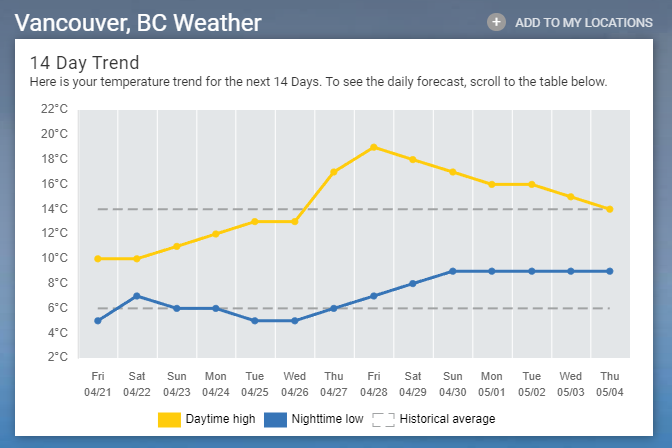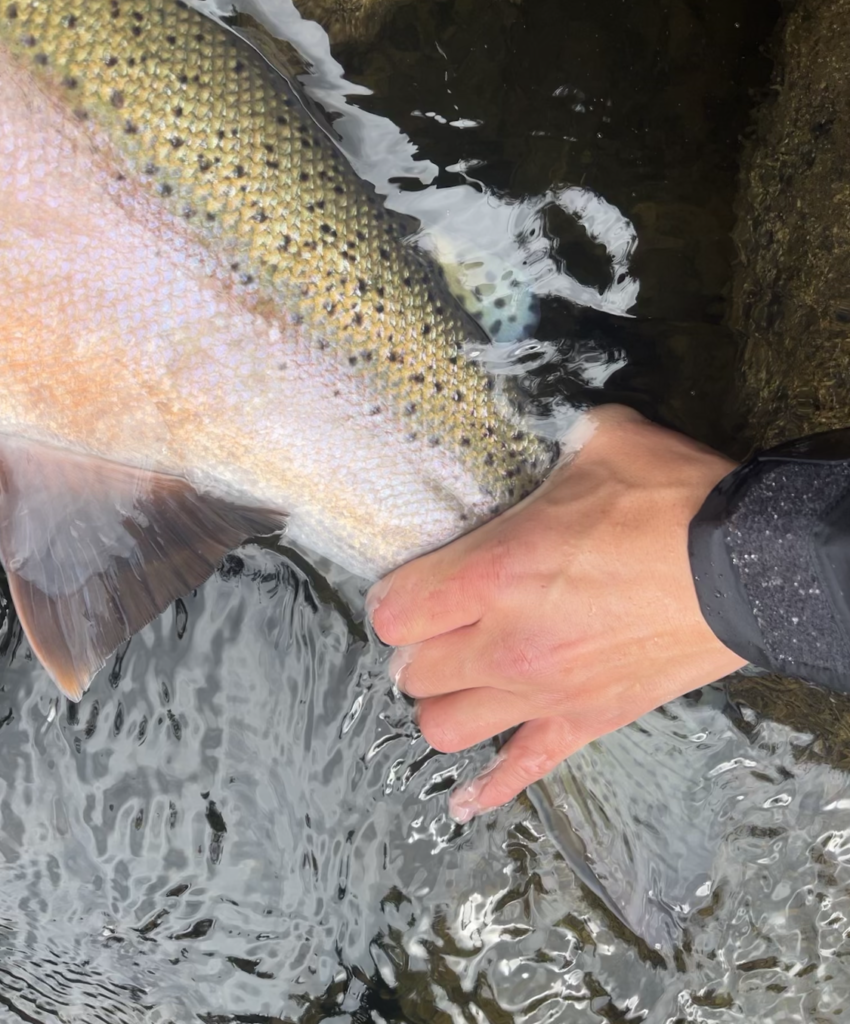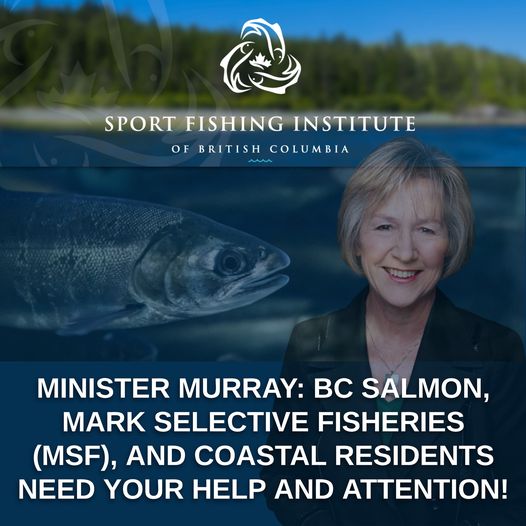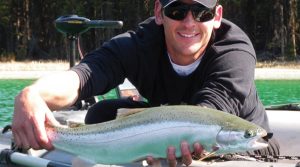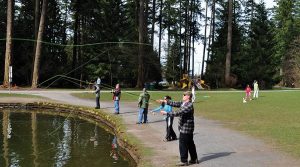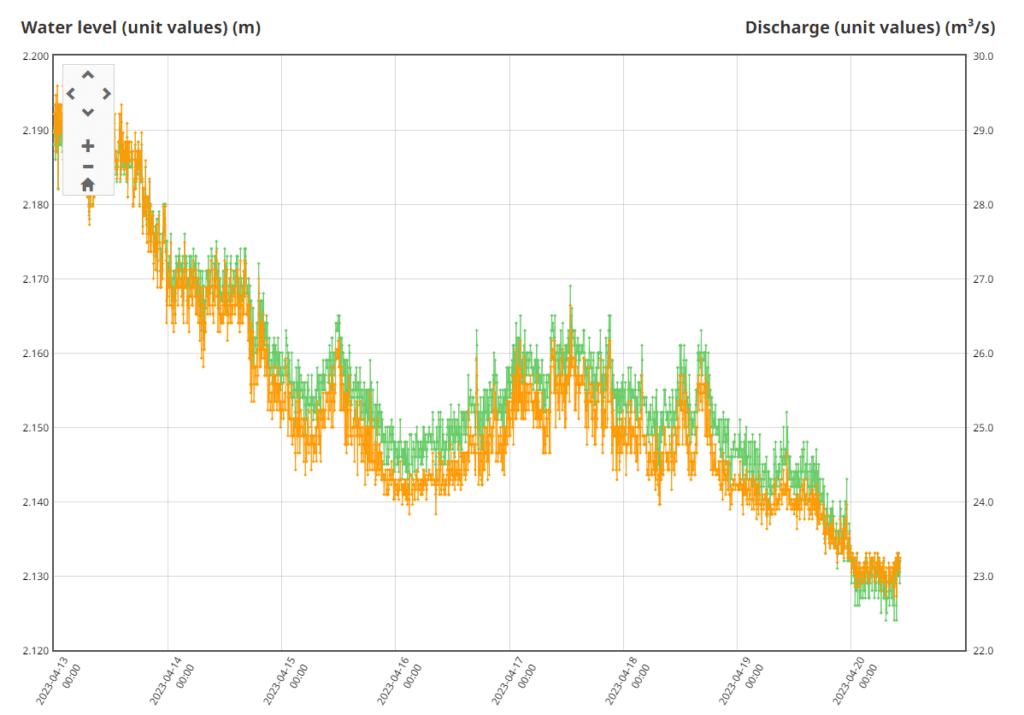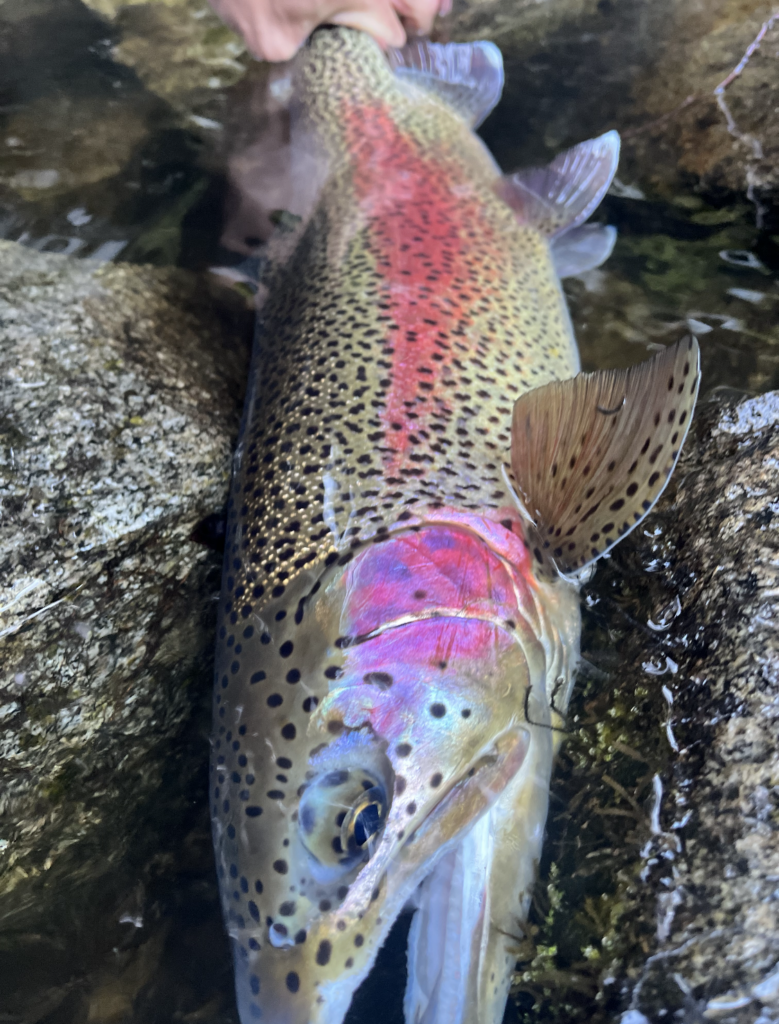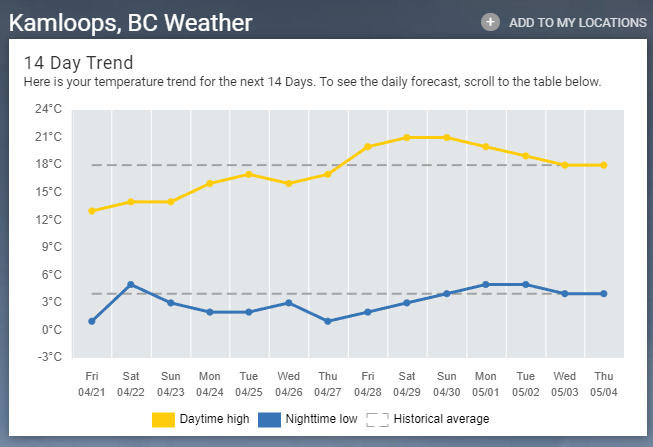OUTLOOK
There is warmer dry weather incoming! Just not this weekend. It looks as though we will see another damp weekend, but the good news is next week, we will see clear skies and increasing temperatures. We might even see our first high teens weekend next week in Vancouver and 20s in the interior!
We have a number of updates on our Lower Mainland/Sea to Sky rivers where even though there was fairly heavy rain last weekend, the rivers didn’t move much because of cool temps and low snow levels. This made for some good steelheading, but less than ideal fry eater conditions. We heard some positive reports of cutthroat in the Fraser and other tributaries, but we are still not loving the bull trout and cutthroat conditions up the Harrison and Squamish ways. The rain this weekend might help as long as the warmer temps get some snow melt going.
The other fishery well worth going for this weekend or next is the interior lake fishing. We are starting to see lakes icing off at the 2000-2500 level and some of the lower elevation lakes that had been holding on are now off. We have heard that some of the lakes have been off for a week or two and are now in turn over, so the season is upon us!
On to the report!
INDUSTRY EVENTS AND UPDATES
If you are a saltwater angler or have been reading our reports and following along re: regulations on the saltwater front, you will know that we were hoping for an April/May pilot fishery in Howe Sound as well as some in other locations along the coast. Well, it is closing in on May and we have no updates on these pilot opportunities.
Our hard-working colleagues at both the Public Fishery Alliance and the Sport Fishing Institute of BC have been meeting with the Minister’s staff and applying pressure to have these science-based, conservative, and precautionary approaches to support implementation of hatchery-based Mark Selective Fishery (MSF) pilot fisheries in Howe Sound, Southern Gulf Islands, Haro Strait and Juan De Fuca Strait approved.
If you missed their recent letters to the Minister, we’ve included them here for you today!
The Public Fishery Alliance’s letter is below and be sure to check the call to action on its latest Blog Post. We will keep you posted on any petitions and events coming up!
RE: Proposed New Spring 2023 Marked Selective Chinook Fishery Pilots Did Not Open
“Dear Minister Murray,
The Public Fishery Alliance Board of Directors and our members are extremely disappointed by your decision not to approve and open any of the new pilot marked selective Chinook fisheries as proposed by your own department and planned to begin April 1, 2023. (a link to DFO’s – MSF proposed new pilots for spring 2023 can be found at the end of this letter)
Recognizing the current conservation needs of certain Chinook stocks of concern, our fishery requests only sought the barest minimum hatchery fish retention opportunity with almost zero impact to wild Chinook and being based upon your own department’s analysis using the latest scientific data. The timing and location of these pilot fisheries also has no impact on SRKW recovery.
Predictability is vital – Even though the recent DFO Chinook management announcement, Fisheries Notices # 0330 and 0331, (a link to these DFO fisheries notices can be found at the end of this letter) indicates there may be opportunity forthcoming in future fisheries notices, this provides little comfort to anglers and businesses that rely on the public fishery who prepared for April 1st opportunities.
Managing the public fishery with last minute announcements of this significance is terribly damaging to fishing guides, lodges, tackle stores and other businesses in small coastal communities that service angling customers. These businesses cannot not switch on in an instant, they require sufficient lead time to attract and book clients, acquire fishing tackle to stock shelves, and provide bookings for accommodations. Timely advance planning for public Chinook fishing is particularly vital to these communities, and the recreational fishery as a whole. Especially those who fish for Chinook off South Vancouver Island and the waters near Vancouver and the Lower Mainland. In addition, the consultation and fisheries planning process is out of sync with the needs of the public salmon fishery.
Public Chinook fisheries cannot be managed in the same way the department manages commercial salmon fisheries. Successful commercial salmon fisheries catch as much fish as allowed in the shortest time possible. Conversely, public salmon fisheries do not measure success by the volume of salmon caught, but by the length of time provided for anglers and angling businesses take part in those fisheries. So, each day lost in time-limited pilot fisheries is extremely costly, and cannot be recovered.
Anti-public fishery lobbying – In our opinion, your decision not to open the department’s proposed additional pilot marked selective Chinook fishing opportunities on April 1st was due to considerable pressure you received directly from very vocal environmental and indigenous lobby groups. Many of these groups do not like angling and seek to end the public Chinook fishery in Southern BC. However, not liking angling is not a valid reason for continuing non-retention of Chinook where and when there is no justification for it.
We submit that these groups will continue to find any excuse to delay and block legitimate attempts by our sector to develop modest mark selective public salmon fisheries, where important Chinook fisheries once existed. This is something that must be resisted.
Between the COVID pandemic and overly harsh salmon fishery regulations, in Southern BC our sector is struggling. Under the Pacific Salmon Strategy Initiative, your department is moving towards mass marking of hatchery Chinook and implementing marked selective fishing at a slow and drawn-out pace. A viable public Chinook fishery brings great economic and social value. It also provides the crucial creel and stock composition data that should be the basis of wisely managing our fisheries with impartiality.
After five years of oppressive Chinook non retention regulations covering four months during the peak fishing season, it is time to open marked selective fisheries where there is no reasonable science-based rationale for keeping them closed. These extremely modest and legitimate proposals are a critical step along that road. The Public Fishery Alliance strongly urges you to immediately approve and open these additional pilot fisheries.
Yours in conservation,
Signed on behalf of the Public Fishery Alliance Board of Directors”
The team at the Sport Fishing Institute has also been applying the pressure and if you missed its open letter to the Minister, have a read of it below.
“An open letter to the Minister Joyce Murray:
The southern BC angling community continues to face frustration, uncertainty, and socioeconomic harm as a direct result of Minister Murray’s failure to acknowledge the importance of opportunity and timely decision making.
Despite efforts that have spanned years by stakeholders and DFO regional staff to provide Minister Murray with a science-based, conservative, and precautionary approach to support implementation of hatchery-based Mark Selective Fishery (MSF) pilot fisheries in Howe Sound, Southern Gulf Islands, Haro Strait and Juan De Fuca Strait for April 1st, as of today, April 18th, no decision or further information has been provided to the March 31st Fisheries Notices. Already more than 25% of a limited opportunity for these modest but important, precedent setting and time sensitive proposals is lost.
As a West Coast Minister, we were hopeful that fishery related decisions that would help British Columbians by providing a minimum of stability, economic activity, social well being, and improved food security in a highly sustainable manner would be a priority. However, based on the lack of regard for the care, analysis and cautious proposals developed collaboratively by DFO and stakeholders and in the face of consistent indication of the critical importance of these opportunities, we are left to wonder if BC fisheries, citizens and communities are a priority for DFO or the Minister at all.
As detailed and mentioned many times before, the MSF fisheries in question are highly precautionary, are based on decades of stock composition and mark rate data and have undergone extensive analysis and evaluation by DFO stock assessment and science staff to demonstrate virtually zero impact on stocks of concern. Additional stock assessment and catch monitoring resources both within DFO and through collaboration with trained citizen scientists are standing by to provide additional data to further demonstrate the sustainable nature of these types of fisheries and to help inform best use of MSF in the future.
As part of the Pacific Salmon Strategy Initiative, DFO appears to be moving down the path of Harvest Transformation and have explained that MSF is expected to play a role. But with the lack of decision and reluctance to implement these pilot fisheries, which are as precautionary and sustainable as any fishery could ever be, how can DFO ever implement any MSF fishery anywhere in the province? This is beyond troubling for the hundreds of thousands of British Columbians who are dependent on fishery activity for food, employment and cultural activity and threatens to ignore the millions of dollars already invested by DFO to transform fisheries and an approach to sustainable fisheries management. Based on decades of implementation in the US, MSFs are proven to maintain fishery activity while unmarked stocks of concern are avoided and allowed to rebuild. Rebuilding stocks of concern is a priority for British Columbians and DFO’s mandate so too is allowing for sustainable fishery activity.
For two of the three MSF pilot fisheries in question, April and May are the only months that allow for near zero impact to stocks of concern. Starting and finishing later is not an option due to known stock composition changes through the season and in the specific areas. Each pilot proposal is accompanied by plans for enhanced monitoring and sampling to learn more about how to best implement MSFs in the future. Without implementation of these proposals that learning is not possible. We appeal to DFO, and especially Minister Murray, to acknowledge the critical importance of sustainable access to fishery resources to all British Columbians by implementing these responsible, prudent pilot fisheries immediately.
The SFI Team”
APRIL & MAY COURSES
Introduction to Chironomid Techniques
Chironomids are the number one food source for trout in BC’s lakes; however, few anglers have taken the time to become true masters of this discipline. Those that do are often rewarded with the largest fish. Trevor is a former member of the Canadian Fly Fishing Team and an excellent chironomid angler. Dedication to his sport has helped Trevor become one of the top fly fishermen in the province as well as a fisheries biologist. This course is comprised of one 3hr evening seminar. Content is for beginner to advanced.
Date: Apr 25, 2023
Cost: $60.00+GST
Time: 6:30pm – 9:30pm
Introduction to Fly Fishing
This course is specifically designed to give the new fly fisher the basic knowledge, casting skills and fly fishing strategies to effectively fish our local BC waters. This course is comprised of two sessions; 3hr evening seminar and a 3hr casting session. The dates below show the seminar date first and casting date second.
Dates: May 9 & 13, Jun 14 & 17, July 11 & 15, Sept 19 & 23
Cost: $175.00+GST
Seminar Time: 6:30pm – 9:30pm
Casting Time(s): 10am – 1pm or 1:30pm -4:30pm
FRESHWATER FISHING REPORTS
Chilliwack/Vedder River Fishing Report
There are ten days left until the end of the gear fishing season on the Chilliwack and it is still well worth getting out for a last kick at the can. We still have low water levels, and we did see some dirty water last weekend, but the river is dropping and with less rain in the forecast this weekend it could be good.
It is late and there is no fishing above Tamihi Bridge, but we are still hearing reports of fishing with even the odd fresh silver fish still coming into the system. There are less hatchery fish around right now so if you catch a wild fish, treat them with respect and good fish handling techniques. ,Some of them will be trying to make their way back out to the ocean and every wild fish that can make that journey is a gift.
Getting out for one last drift looks like a good idea with the conditions we are seeing this season.
Good Luck!
Squamish River Fishing Report
We were hoping for the river to rise last weekend, but it didn’t move much. We saw a little more coloured water on Sunday, but it was by no means perfect. This made for challenging bulltrout fishing, but we did hear some steelhead reports.
We are hopeful that although the rain this weekend is not heavy, we will see more of a river bump with warmer temperatures. It is a long shot with only 5-10 mm each day in the forecast, but it is worth watching.
The good news is if the weatherman is on his game and the heat coming next week arrives, we should start seeing some snow melt that will move river levels. It will be nice to see more normal spring conditions with water clarity turning a green or off brown. We usually see more active and aggressive fish when this starts to kick in.
Overall, it’s well worth getting out. Make sure to have a selection of streamer style patterns for the fry eaters and steelhead options are well worth your effort right now.
STILLWATER FISHING REPORTS
Interior Lake fishing Report
Things have been a little unstable in the interior with cool nighttime temperatures, but things are changing. We are going to see more seasonally normal temperatures and by the end of next week we might see the first 20-degree days in Kamloops! You know that that means – IT’S GO TIME!
This is awesome news for those who plan to get out. We are hearing reports of ice off on many lakes under the 2500 ft elevations. Some are already in turn over so if you are heading out make sure to have a backup lake ready to try if your given lake is in turn over when you arrive.


